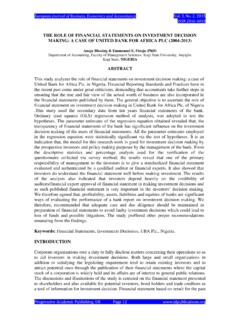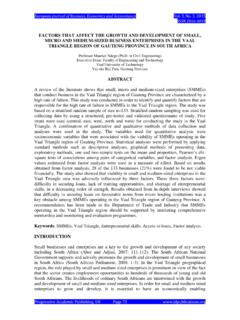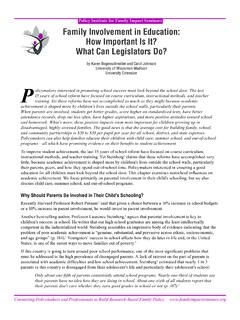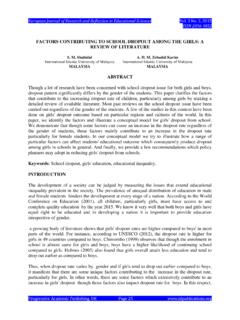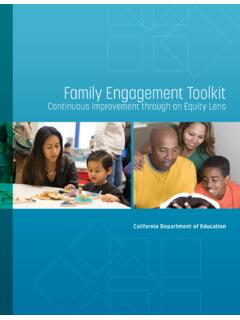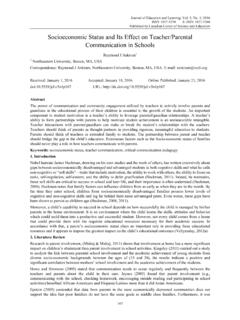Transcription of FACTORS AFFECTING PARENTAL INVOLVEMENT IN THE …
1 International Journal of Academic Research and Reflection Vol. 5, No. 1, 2017 ISSN 2309-0405 Progressive Academic Publishing, UK Page 74 FACTORS AFFECTING PARENTAL INVOLVEMENT IN THE SCHOOLING OF CHILDREN MAGWA, S. MUGARI, S. Department of Educational Foundations Department of Curriculum Studies Faculty of education Faculty of education Great Zimbabwe University, Masvingo Great Zimbabwe University, Masvingo ABSTRACT PARENTAL INVOLVEMENT (PI) in the education of children is not a recent phenomenon.
2 PI has become an established feature of education policies across the developed world. The study set to establish FACTORS that may make parents choose not to participate in education process or unable to become more involved. The study was grounded in Epstein s overlapping spheres of influence theory. A qualitative case study was employed. Purposive sampling was used to select (4) schools and (40) participants in Masvingo district. Findings revealed that the economic status and level of education of parents have a significant effect on children s education . It also emerged that parents are more likely to be involved when teachers perceptions about role of parents are positive.
3 The study established that PI is also influenced by age of children. The study recommends that parents be helped to appreciate the benefits of PARENTAL INVOLVEMENT in the learning of their children. Workshops should be established to develop the relationship between parents and their children. Keywords: Parent, education , PARENTAL INVOLVEMENT , school, community. INTRODUCTION Parents, who have been considered as one of the stakeholders of the school community, play tremendous roles in children s education . among the many tenets of the educational reform efforts is the idea that (PI) is an essential element in children s academic achievement and social adjustment (Jeynes, 2012).
4 PARENTAL INVOLVEMENT according to Miksic (2015) can be broadly defined as the ways in which parents support their children s education in word and deed. Parents can be involved in the school setting or at home. Prominent aspects of PI at home include discussion of school activities, PARENTAL aspirations and expectations, checking homework, parenting style, home roles and supervision. At school prominent aspects of PI include contacting school personnel, attending parents, teacher organisations (PTO), and volunteering at school (Shote, Hansen, Underwood and Razzoole, 2011 as well as Dearing, McCartney and Weiss, 2006).
5 Student achievement is most commonly defined by report cards and grades, enrolment in advanced classes, attendance and staying in school, and improved behaviour (Henderson and Mapp, 2002). Research has shown that there is correlation between PI and academic achievement. Sheldon and Epstein (2005) conducted a study to determine if a correlation existed between PI and children s performance on Mathematics achievement tests in 18 schools in Ohio, Maryland, Wisconsin, Minnesota, Michigan, Kansus and Califonia. They established that learning-at-home-activities linked consistently with improvement on Maths achievement tests.
6 Children who worked with their parents at home on Mathematics homework achieved better Mathematics grades (Bartel, 2010). International Journal of Academic Research and Reflection Vol. 5, No. 1, 2017 ISSN 2309-0405 Progressive Academic Publishing, UK Page 75 Schools are developing programs aimed at reaching out to parents in hopes of improving the relationship that exists between school and families of learners. Parents are already involved as primary teachers of their children as soon as they are born, and it makes sense to continue involving them in the formal education of their children (Liu and Liu, 2000).
7 They are the children s first teachers and have a life-long influence on children s values and aspirations. In the United States of America evidence of PI in education exists both at home and within the school. According to Echaune, Ndiku and Sang (2015) The No Child Left Behind Act of 2001 recognizes parents INVOLVEMENT and empowerment in determining the quality of teaching and learning processes in schools. Echaune et al (2015) assert that in most African countries such as Uganda, South Africa, and Kenya policies that support PI are also noted. According to these authors in Kenya the Basic education Act of Kenya 2013 was enacted requiring school Boards of Management to assess school needs with full participation of parents.
8 Nyarko (2011) investigated the effects of PI in schools on academic performance in Ghana and the results revealed a positive significance correlation between PI and academic achievement. In Zimbabwe Chindanya (2011) carried out a study on PI in primary schools of Zaka district and the results revealed its many benefits. Same of the benefits of PI raised included promotion of pupils motivation, teacher motivation, improved school attendance and good behaviour. The idea that PI engenders student academic achievement is appealing to the point that society in general and educators in particular have considered PI an important ingredient for the remedy of many ills in education today.
9 There are however some FACTORS that constrain parents ability to become actively in their children s education . It is crucial to uncover FACTORS contributing to the gaps in educational achievement for all children. STATEMENT OF THE PROBLEM Some parents are not taking an involved approach to their children s education . They are not in regular contact with their children s teachers. This study set to investigate the FACTORS that hinder parents active INVOLVEMENT in their children s education . RESEARCH QUESTION The following research question gave direction and provided continued focus during the study: What are the FACTORS AFFECTING parents INVOLVEMENT in the education of their children.
10 THEORETICAL FRAMEWORK This study was guided by Epstein s overlapping spheres of Influence Model. The most commonly accepted contemporary framework for viewing PI was inspired by the ecological model of Bronfenbrenner 1979. The theory of overlapping spheres encompasses part of Bronfenbrenner s ecological systems model (Harris, 2014 and Kavanagh, 2013). Epstein developed a model which describes the overlapping spheres of influence on the developing child representing family, school and community with the child at the centre (refer to Figure 1). International Journal of Academic Research and Reflection Vol.





